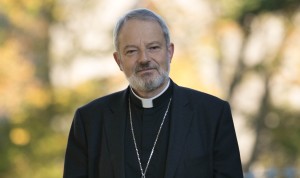
By Cian Molloy - 17 February, 2019

Kevin Doran, Bishop of Elphin, is one of two bishops calling for dialogue between communities and authorities over the housing of refugees.
Two Catholic bishops are calling for dialogue between state planning authorities and local communities after a second fire at a Leitrim hotel that had been ear-marked as a home for refugees.
The government plans to convert the Shannon Key West Hotel, on the banks of the Shannon in Rooskey, into a direct provision centre, with the 39-room facility providing accommodation for up to 80 people who are seeking asylum in Ireland.
However, the building has been hit by two suspected arson attacks, one in January and one earlier this month. The hotel has been closed since 2011.
In a joint statement this week, Bishop Francis Duffy of Ardagh and Clonmacnoise and Bishop Kevin Doran of Elphin, said these fires are “all the more disturbing since it is suggested that the fires are a response to the proposed use of the hotel to house refugees”.
“Militant opposition, expressed in the destruction of property, is simply not consistent with the Gospel,” the bishops said. “Every civilised society is bound under international law to provide shelter for refugees. Jesus teaches us that we will be judged, among other things, on how we respond to the needs of those who are without shelter.”
However, the two churchmen also note that the Catholic Church has frequently expressed concern about the negative aspects of direct provision centres, where asylum seekers are kept, often for years, while their applications for refugee status are processed. Often, the centres in converted hotels are unsuitable for long-term family use, with limited privacy and outdoor play areas for children.
In many places, local SVP conferences are involved in providing additional supports to residents in direct provision centres, supports that the state would not otherwise provide.
“Refugees need to be supported in becoming part of the wider community in which they live,” said the bishops. “We believe that many of our parishioners would want to welcome refugees and offer them such support.”
Nevertheless, some locals in Rooskey, Moville in Co. Donegal and in Wicklow town, have complained that they have not been consulted about the opening of direct provision centres in their towns. The Reception and Integration Agency, which handles accommodation provision for refugees, is not obliged to go through the normal planning process, yet direct provision centres can have a significant impact on local demography and service provision. Rooskey, for example, has a permanent population of less than 600 people – so the direct provision centre would increase that number by about 7.5 per cent.
The two Shannon-side bishops said: “The well-being of local communities and of refugees alike requires that the provision of facilities for those who have lost everything must be carefully planned, in consultation with all the stakeholders, including local schools and health services.
“We join with the clergy and parishioners on both sides of the river in calling on all concerned, including the civil authorities, to engage in the kind of dialogue and consultative planning that will allow the best possible outcome, both for refugees and for the local community.”